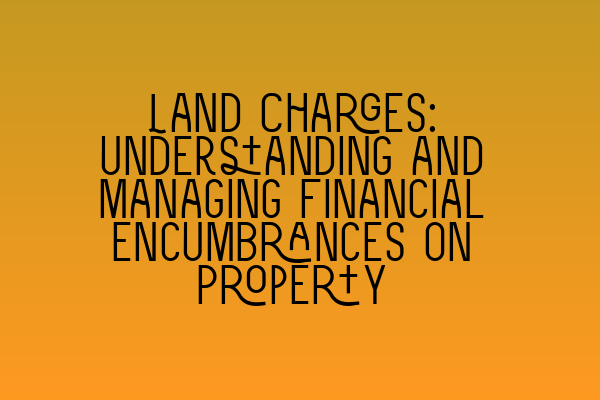Land Charges: Understanding and Managing Financial Encumbrances on Property
When it comes to buying or selling a property, understanding and managing land charges is crucial. Land charges are financial encumbrances or restrictions on a property that can affect its ownership and use. These charges can have a significant impact on property transactions, and it’s important for solicitors and property owners to have a comprehensive knowledge of them.
In this article, we will explore the concept of land charges, their types, how they can affect property transactions, and strategies for managing them effectively. Whether you are a solicitor, property owner, or someone interested in property law, this guide will provide you with valuable insights into the world of land charges.
What are Land Charges?
Land charges are legal interests or burdens that can affect a property. These charges are registered against the property itself, rather than against the individual owner. They can restrict the ownership, use, or transfer of the property and can have financial implications.
Land charges are typically registered with the Land Charges Department of the Land Registry. This registration ensures that they are publicly disclosed and can be inspected by anyone with an interest in the property. It is important to conduct a thorough search of land charges when buying or selling a property to avoid any surprises or complications down the line.
Types of Land Charges
There are several types of land charges that can affect a property. Some of the common ones include:
- Mortgages: A mortgage is a common type of land charge that is registered when a property is used as security for a loan. It gives the lender the right to take possession of the property if the borrower fails to repay the loan.
- Equitable Charges: Equitable charges are registered against a property when someone has a beneficial interest in it, even if they do not hold legal title. This can include situations where someone has contributed towards the purchase or maintenance of the property.
- Restrictive Covenants: Restrictive covenants are obligations or restrictions imposed on a property by a previous owner. These can include limitations on its use, alterations, or development.
- Notices: Notices are land charges that provide information about certain issues affecting the property, such as bankruptcy proceedings, pending legal actions, or restrictions on development.
- Charges for Unpaid Taxes or Debts: These charges are registered against a property when the owner has outstanding taxes or debts that need to be paid.
It’s important to note that land charges can vary depending on the jurisdiction. The above examples are common in the United Kingdom, but different countries may have their own unique types of land charges.
Impact on Property Transactions
Land charges can have a significant impact on property transactions. When buying a property, it is essential to conduct a thorough search of land charges to identify any encumbrances or restrictions. This allows the buyer to make an informed decision and assess the potential liabilities associated with the property.
If a property has outstanding mortgages or other significant financial encumbrances, it can affect the buyer’s ability to secure financing. Lenders are often reluctant to provide loans for properties with substantial debts or charges, as it increases the risk associated with the transaction.
Additionally, restrictive covenants can limit the use or development of the property. For example, if a property has a covenant that prohibits building extensions or alterations without permission, the buyer may need to seek consent from the relevant authorities before making any changes. Failure to comply with restrictive covenants can result in legal consequences and financial liabilities.
Managing Land Charges
Managing land charges effectively is essential for both solicitors and property owners. Here are some strategies for handling land charges:
- Thorough Due Diligence: When buying a property, conducting a comprehensive search for land charges is crucial. This includes obtaining land registry searches, local authority searches, and other relevant investigations to identify any encumbrances. Consulting with an experienced property lawyer can help ensure that all necessary searches are conducted.
- Negotiating with Lenders or Chargeholders: If a property has outstanding mortgages or other significant charges, it may be necessary to negotiate with the lenders or chargeholders to discharge or reduce the charges. This can involve negotiating repayment terms, seeking loan consolidation, or exploring other alternatives to alleviate the financial burden.
- Variation or Discharge of Restrictive Covenants: In some cases, it may be possible to seek a variation or discharge of restrictive covenants. This can involve obtaining consent from all relevant parties or applying to a court or tribunal for a modification or release of the covenant. It’s essential to seek legal advice in these situations to navigate the complex legal requirements.
- Obtain Indemnity Insurance: In certain circumstances, it may be possible to obtain indemnity insurance to protect against potential liabilities arising from land charges. This can provide peace of mind to both buyers and lenders, but it’s important to carefully review the terms and conditions of the insurance policy.
By implementing these strategies and working closely with an experienced property solicitor, it is possible to effectively manage land charges and minimize their impact on property transactions.
Conclusion
Land charges are an integral part of property law and can have far-reaching implications on property transactions. Understanding the types of land charges, their impact on transactions, and effective management strategies is crucial for solicitors, property owners, and anyone interested in property law.
If you’re preparing for the SQE exams or looking for SQE exam practice materials, check out our related articles:
SQE 1 Practice Exam Questions
SQE 1 Practice Mocks FLK1 FLK2
SQE 2 Preparation Courses
SQE 1 Preparation Courses
SRA SQE Exam Dates
